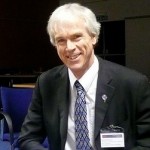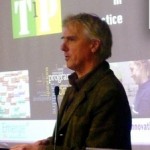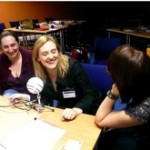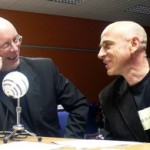Radio goodness at Online Educa Berlin
It is nearly the end of November and time for Pontydysgu’s annual trip to Online Educa Berlin. And as usual, together with our friends form the University of Koblenz) we will be presenting our Internet Radio show, the Sounds of the Bazaar, live from the conference.
Sounds of the Bazaar will go out on Thursday 5th of December and Friday 6th December at 1100 – 1140 Central European Time. As usual we will present all the best from Online Educa, including interviews with speakers and participants and visitors and reflecting on this years developments and trends in the use of technology for learning.
There are different ways you can get involved. If you are coming to Online Educa we would love to interview you live on the show. Just email me Graham Attwell at graham10 [at] mac [dot] com telling me what you would like to talk about. Or come along to find us at our planning meeting from around 1400 on Wednesday 4th in the Marlene Bar. Or just turn up for the broadcast – once more by the Marlene Bar – and we will try to fit you in. If you aren’t lucky enough to be coming to the conference in Berlin, then be sure to tune into our programmes.
The address of our live stream is http://uk2.internet-radio.com:31022/live.m3u. Open this in your internet browser and it should stream from your MP3 player of choice (e.g. iTunes). And we will tell you how you can get in touch with us to ask your own questions or give us feedback on the broadcasts.
This year we have a special extra programme. RadioActive Europe is a European Commission funded project a pan-European Internet Radio platform, incorporating Web 2.0 functionality, linked to innovative community based pedagogies to address themes of employability, inclusion and active citizenship in an original and exciting way. Along with the project coordinators, the University of East London and the University of Koblenz, we will be presenting the project on the European Commission stand that Online Educa. As part of our presentation , we will, of course be broadcasting a live radio show. We will be talking live to the different project partners and exploring their work with different groups through RadioActive Europe. At the same time we will be featuring short clips from broadcasts for each of the project partner countries – in the UK, Germany, Portugal. Romania and Malta.
And once more we would love to hear from you. The programme will go out from 1215 to 1300 CET on Thursday 4th December from the EU stand at the conference. Once more if you are not able to be in Berlin tune onto the programme live. The address for the radio stream is http://uk2.internet-radio.com:31244/live.m3u.
If you cannot listen n live, podcasts from the programmes will be available on the RadioActive101 web site, the Pontydysgu web site and Online Educa following the conference.
Look forward to talking to you all – face to face or live on internet radio – next week.




